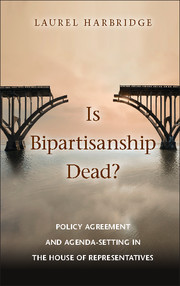Book contents
- Frontmatter
- Contents
- List of figures and tables
- Acknowledgments
- 1 Introduction
- 2 A Puzzle of Declining Bipartisanship
- 3 Strategic Partisan Agenda-Setting
- 4 Agenda-Setting and the Decline of Bipartisan Cooperation
- 5 Variation in Strategic Partisan Agenda-Setting
- 6 Strategic Partisan Agenda-Setting Across Policy Areas
- 7 District Responsiveness and Member-Party Relationships
- 8 The Past, Present, and Future of Bipartisanship
- Appendix
- References
- Index
6 - Strategic Partisan Agenda-Setting Across Policy Areas
Published online by Cambridge University Press: 05 March 2015
- Frontmatter
- Contents
- List of figures and tables
- Acknowledgments
- 1 Introduction
- 2 A Puzzle of Declining Bipartisanship
- 3 Strategic Partisan Agenda-Setting
- 4 Agenda-Setting and the Decline of Bipartisan Cooperation
- 5 Variation in Strategic Partisan Agenda-Setting
- 6 Strategic Partisan Agenda-Setting Across Policy Areas
- 7 District Responsiveness and Member-Party Relationships
- 8 The Past, Present, and Future of Bipartisanship
- Appendix
- References
- Index
Summary
In response to a U.S. export subsidy that had triggered international sanctions in 2004, Republican William Thomas (R-CA) introduced a bill to amend the Internal Revenue Code to make manufacturing, service, and high-technology businesses more competitive. The bill (H.R. 4520) provided for a massive corporate tax overhaul, which was enacted into law in October of 2004 (Public Law 108–357). From its inception, the legislation was highly partisan. Not only did a Republican sponsor the bill, but 40 Republicans cosponsored it. The committee markup session ended in a partisan vote, with only 3 Democrats joining all 24 Republicans in support of the bill. The House roll call votes were similarly partisan, with the votes on final passage and on agreement to the conference report falling along party lines. In both cases, an overwhelming majority of Republicans supported the bill (202 on the first vote; 207 on the second) and an overwhelming majority of Democrats opposed the bill (154 on the first vote; 124 on the second vote). In both chambers, partisan conflict ignited from the macroeconomic and labor issues in the legislation (Corporate Tax Breaks Enacted 2005).
Contrast this example with legislation that garnered bipartisan support in 2005 on surface transportation. In February 2005, Republican Representative Don Young (R-AK) introduced legislation (H.R. 3) to authorize $244 billion for surface transportation programs in fiscal years 2005 through 2009. The legislation – which became the Safe, Accountable, Flexible and Efficient Transportation Equity Act: a Legacy for Users (SAFETEA-LU) – was bipartisan throughout its development. Of the 79 cosponsors on the original bill, 39 were Democrats and 39 were Republicans (the remaining cosponsor was a delegate from Puerto Rico). All of the roll call votes were also bipartisan. For instance, the House final passage vote had the support of 218 Republicans, 198 Democrats, and 1 Independent. Only 9 members, all fiscally conservative Republicans, voted against the legislation. “‘Every page of this bill has been built on accommodation and compromise,’ said Bill Thomas, R-Calif., chairman of the House Ways and Means Committee and a key broker in the conference negotiations” (Compromise Highway Bill Completed After Two-Year Clash 2006).
- Type
- Chapter
- Information
- Is Bipartisanship Dead?Policy Agreement and Agenda-Setting in the House of Representatives, pp. 115 - 139Publisher: Cambridge University PressPrint publication year: 2015



